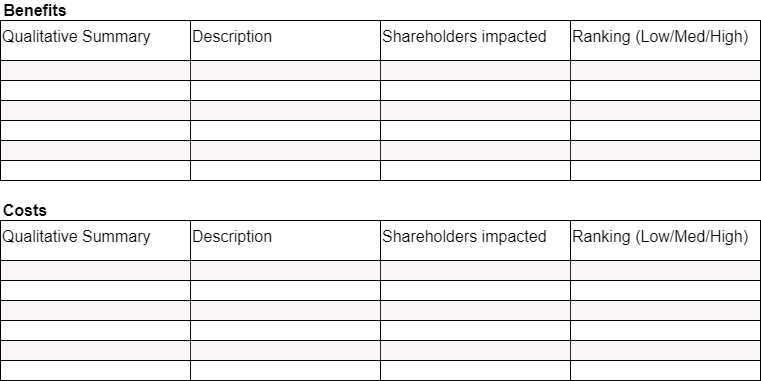Business Case Template
Document sign off
This document has been approved as the Final Report for the ………………….. and accurately reflects the current understanding of the project.
Prepared by:
_______________________________
Preparer:
Date:
Role:
Approved by:
_______________________________
Approver:
Date:
Role:
Glossary of Terms
This table contains a list of any terms that have been used throughout the document.
- SME: Subject Matter Expert
Executive Summary
An Executive Summary on the project and the business case recommendations.
Purpose
A description on the purpose of having the business case, e.g.
- Describe the options of solving the problem
- Analyse what will happen of various options being considered
- Provide an objective (non-emotional) assessment
- Analyse how the potential solution meet the organisation objectives
- Identify what resources (costs) and benefits are required for implementation
- Provide a recommendation on the best option
Approach
A description on what approach has been used to develop the business case, e.g.
- Identify viable alternatives that solve the decision-making problem.
- Analyse the alignment of the alternatives to strategic objectives of OMD
- Review all stakeholders that have an interest in either alternative
- Complete a Quantitative and Qualitative cost/benefit analysis
- Complete a Risk Assessment to develop a Risk Factor
- Final Recommendation
Project Vision
Insert the vision of your project
Project Objectives
Insert the project objectives
Project Scope and Timing
Define the project scope, including what is out of scope if relevant:
Define the project timing:
Project Benefits
Insert the project benefits:
Include both tangible and intangible benefits and provide as much evidence for these benefits as possible e.g. trend based projections, examples using similar project.
Project Stakeholders
Insert details of all stakeholders involved in the project:

Strategic Alignment
Describe how the project aligns to the OMD strategy
Options considered
Describe the different options being considered:

Summarise options considered:
Quantitative Cost-Benefit Analysis
Include a costing template that contains the following information for all options being considered:
- Benefits:
- Cost savings
- Cost avoidance (cost no longer required in the future that was expected before this project was delivered)
- Revenue
- Costs:
- Non-recurring (one off)
- Recurring (ongoing)
- Net Benefit $
- NPV
Summarise Quantitative Cost-Benefit analysis:
Cost-Benefit Analysis
Complete a template that captures Qualitative Cost-Benefit analysis for all options being considered, e.g. information captured through the engagement of the project key stakeholders:
Option 1:
Summarise the different options considered (Low/Med/High):
- Summary of Total Benefits:
- Option 1
- Option 2
- Summary of Total Costs:
- Option 1
- Option 2
- Overall Qualitative Value of Each Alternative:
- Option 1
- Option 2
Risk Assessment
Complete a template that all risks relating to each option being considered – use a risk rating scale of 1 for low and 5 for high:

Summarise Overall Project Risk Assessment:
- Option 1
- Option 2
Conclusion and Recommendations
Provide a summary of the recommended option.
Summarise the options being considered:
